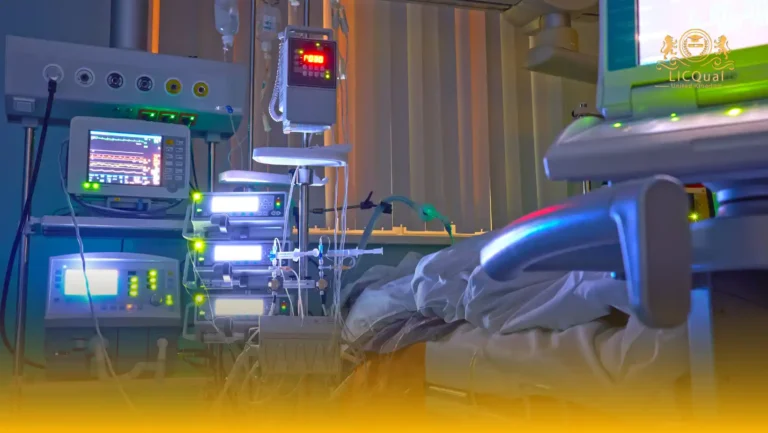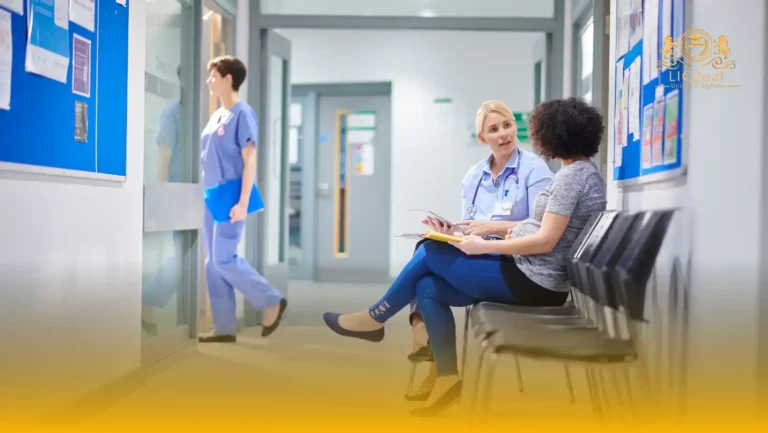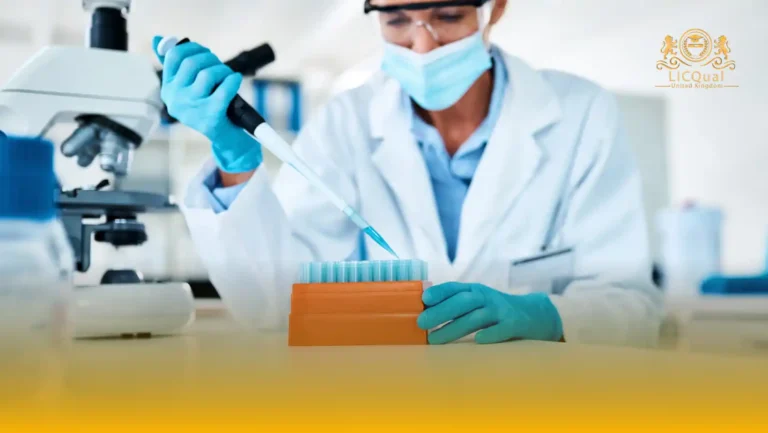The LICQual Level 6 Diploma in Regenerative Medicine (Dip RM) is an advanced qualification designed for healthcare professionals, clinicians, and researchers who wish to specialize in the rapidly evolving field of regenerative therapies. This diploma is not intended for fresh candidates; it is specifically tailored for experienced professionals seeking to enhance their career prospects, broaden their scientific and clinical knowledge, and strengthen their Continuing Professional Development (CPD).
Learners undertaking this programme will gain comprehensive expertise in stem cell biology, tissue engineering, gene therapy, and regenerative treatment strategies for a range of clinical conditions. The course covers fundamental principles, advanced laboratory techniques, translational research, ethical and legal considerations, and patient-centred approaches in regenerative medicine. Learners will develop the skills to critically evaluate emerging therapies, design evidence-based treatment protocols, and apply innovative clinical interventions to improve patient outcomes.
Centres delivering the LICQual Level 6 Diploma in Regenerative Medicine are required to maintain the highest standards of training. This includes employing competent and qualified staff, providing access to modern laboratory facilities, clinical environments, and up-to-date learning resources, and ensuring all necessary materials are available to support learner success. Such professional infrastructure guarantees a rigorous, practical, and engaging learning experience, allowing learners to apply theoretical knowledge effectively in research and clinical practice.
By completing this diploma, learners will enhance their professional credibility, contribute to the advancement of regenerative medicine, and apply cutting-edge therapies within clinical and research settings. This qualification equips learners with the advanced knowledge, skills, and professional recognition necessary to excel in the field of regenerative medicine and drive innovation in healthcare practice.
Course Overview
Qualification Title
LICQual Level 6 Diploma in Regenerative Medicine (Dip RM)
Total Units
6
Total Credits
120
GLH
480
Qualification #
LICQ2200953
Qualification Specification
To enroll in the LICQual Level 6 Diploma in Regenerative Medicine (Dip RM), applicants must meet the following criteria:
|
Qualification# |
Unit Title |
Credits |
GLH |
|---|---|---|---|
|
LICQ2200953-1 |
Foundations of Regenerative Medicine |
20 |
80 |
|
LICQ2200953-2 |
Stem Cell Biology and Therapeutic Applications |
20 |
80 |
|
LICQ2200953-3 |
Tissue Engineering and Biomaterials |
20 |
80 |
|
LICQ2200953-4 |
Gene and Molecular Therapies |
20 |
80 |
|
LICQ2200953-5 |
Research, Evidence-Based Practice, and Innovation in Regenerative Medicine |
20 |
80 |
|
LICQ2200953-6 |
Professional Practice and Continuing Development in Regenerative Medicine |
20 |
80 |
By the end of this course, learners will be able to:
Unit 1: Foundations of Regenerative Medicine
By the end of this unit, learners will be able to:
- Critically evaluate the basic principles of regenerative medicine, including tissue repair, cellular regeneration, and stem cell biology.
- Analyse the physiological and molecular mechanisms underlying tissue regeneration and repair.
- Demonstrate understanding of ethical, legal, and professional responsibilities in regenerative medicine practice.
- Assess the impact of regenerative therapies on patient outcomes and quality of life.
Unit 2: Stem Cell Biology and Therapeutic Applications
By the end of this unit, learners will be able to:
- Critically appraise different types of stem cells, including embryonic, adult, and induced pluripotent stem cells (iPSCs).
- Evaluate the therapeutic potential of stem cells in treating degenerative diseases and injuries.
- Apply laboratory techniques for stem cell isolation, culture, and differentiation.
- Demonstrate evidence-based application of stem cell therapies in clinical and research settings.
Unit 3: Tissue Engineering and Biomaterials
By the end of this unit, learners will be able to:
- Analyse the principles and techniques of tissue engineering for organ and tissue regeneration.
- Evaluate biomaterials, scaffolds, and 3D culture systems used in regenerative medicine.
- Apply knowledge of cellular and material integration to enhance tissue repair and functional outcomes.
- Demonstrate understanding of laboratory and clinical considerations in designing tissue engineering strategies.
Unit 4: Gene and Molecular Therapies
By the end of this unit, learners will be able to:
- Critically assess the role of gene therapy and molecular interventions in regenerative medicine.
- Analyse delivery methods, vectors, and safety considerations in gene-based therapies.
- Apply molecular techniques to enhance tissue repair and regeneration.
- Integrate gene and molecular therapies within clinical and translational research applications.
Unit 5: Research, Evidence-Based Practice, and Innovation in Regenerative Medicine
By the end of this unit, learners will be able to:
- Critically analyse current research, clinical trials, and emerging trends in regenerative medicine.
- Design and evaluate experimental studies, outcome measures, and quality improvement initiatives.
- Apply evidence-based practice to enhance clinical and laboratory decision-making.
- Utilise research findings to inform innovation, policy, and practice improvements in regenerative medicine.
Unit 6: Professional Practice and Continuing Development in Regenerative Medicine
By the end of this unit, learners will be able to:
- Demonstrate professionalism, ethical responsibility, and governance in regenerative medicine practice.
- Apply leadership and teamwork skills within clinical and research multidisciplinary teams.
- Engage in Continuing Professional Development (CPD) to maintain professional competence.
- Implement reflective practice strategies to evaluate performance and enhance research and patient outcomes.
The LICQual Level 6 Diploma in Regenerative Medicine (Dip RM) is designed for healthcare professionals seeking advanced expertise in regenerative therapies, tissue repair, and stem cell applications. This course is ideal for doctors, surgeons, nurses, researchers, and allied health practitioners who want to enhance their clinical skills, gain practical knowledge, and earn a recognized UK qualification. Whether you aim to work in hospitals, research centers, or specialized clinics, this Level 6 Regenerative Medicine Diploma equips you with the knowledge and professional credibility to excel.
Doctors and Surgeons
- Physicians specializing in regenerative therapies and clinical applications
- Surgeons performing advanced tissue repair procedures
- Clinicians implementing evidence-based regenerative treatments
- Professionals seeking UK Level 6 recognized certification
- Doctors enhancing clinical decision-making in regenerative medicine
- Practitioners aiming to improve patient outcomes through innovative therapies
Nurses and Clinical Staff
- Nurses supporting regenerative medicine and stem cell clinics
- Staff assisting in patient care during regenerative procedures
- Healthcare workers monitoring therapeutic outcomes
- Professionals providing patient education and counseling
- Staff aiming to enhance practical and clinical skills
- Professionals improving knowledge in regenerative healthcare practices
Researchers and Academics
- Clinical researchers exploring regenerative medicine advancements
- Academics developing teaching programs in regenerative therapies
- Scientists working with stem cells and tissue engineering
- Professionals integrating research into clinical practice
- Staff contributing to publications and scientific studies
- Practitioners pursuing academic and clinical growth simultaneously
Students and Graduates
- Medical, nursing, and allied health students pursuing specialization
- Recent graduates aiming for clinical or research roles in regenerative medicine
- Individuals seeking postgraduate diplomas for career advancement
- Students combining theoretical knowledge with practical applications
- Learners seeking UK Level 6 recognized certification
- Graduates preparing for professional roles in healthcare and research
Career Advancers
- Professionals aiming for promotions in hospitals, clinics, or research centers
- Practitioners seeking leadership or specialized roles in regenerative medicine
- Clinicians wanting recognized certification to validate expertise
- Healthcare workers targeting advanced responsibilities in clinical care
- Practitioners seeking advanced skills in regenerative therapies
- Professionals enhancing employability and professional development
Allied Health Professionals
- Physiotherapists supporting regenerative rehabilitation programs
- Occupational therapists assisting in tissue repair and recovery
- Healthcare practitioners implementing complementary therapies
- Professionals integrating multidisciplinary approaches in patient care
- Practitioners aiming to improve patient outcomes and quality of life
- Staff enhancing practical and clinical knowledge in regenerative medicine
To deliver the LICQual Level 6 Diploma in Regenerative Medicine effectively, centres must maintain high standards of professional expertise, facilities, and learning resources. The following requirements are essential:
- Qualified and Competent Staff: Centres must employ experienced clinicians, biomedical scientists, stem cell researchers, and healthcare professionals with recognised qualifications. Staff should be capable of delivering both theoretical knowledge and practical guidance in regenerative medicine.
- Comprehensive Learning Resources: Centres should provide learners with access to up-to-date textbooks, research publications, clinical guidelines, case studies, and digital learning platforms to support evidence-based practice and advanced learning.
- Laboratory and Clinical Facilities: Centres must ensure access to fully equipped laboratories, clinical environments, regenerative medicine research facilities, and simulation tools to enable learners to practise techniques in stem cell therapy, tissue engineering, and gene-based interventions.
- Assessment and Evaluation Systems: Centres must implement robust systems for learner assessment, practical evaluations, feedback, and progression tracking to ensure all learners achieve the required competency standards.
- Health and Safety Compliance: Centres are required to adhere to all relevant health, safety, and regulatory standards, providing a safe and professional learning environment for all learners.
- Support for Continuing Professional Development (CPD): Centres should actively support learners in CPD activities, reflective practice, and ongoing professional development to maintain competence and promote career advancement in regenerative medicine.
Meeting these requirements ensures that learners receive a high-quality, professional, and engaging learning experience, equipping them with the knowledge, skills, and confidence to succeed in clinical, research, and leadership roles within regenerative medicine.
Assessment and Verification
All units within this qualification are subject to internal assessment by the approved centre and external verification by LICQual. The qualification follows a criterion-referenced assessment approach, ensuring that learners meet all specified learning outcomes.
To achieve a ‘Pass’ in any unit, learners must provide valid, sufficient, and authentic evidence demonstrating their attainment of all learning outcomes and compliance with the prescribed assessment criteria. The Assessor is responsible for evaluating the evidence and determining whether the learner has successfully met the required standards.
Assessors must maintain a clear and comprehensive audit trail, documenting the basis for their assessment decisions to ensure transparency, consistency, and compliance with quality assurance requirements.







